Pen Farthing: 'I was called disgusting over Kabul animal rescue'
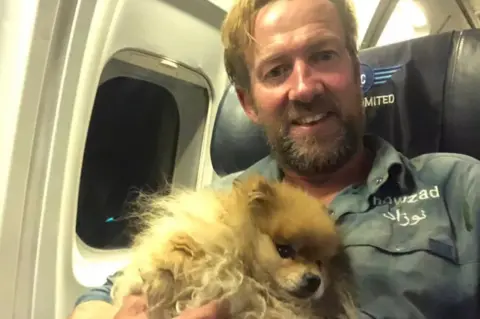 Pen Farthing
Pen FarthingAs a former Royal Marine, Pen Farthing is used to stressful situations. But the events of the last few months would have pushed anyone to their limits.
Fifteen years ago, he set up the animal shelter Nowzad in Afghanistan, to care for animals suffering the fallout from war.
During the fall of Kabul to the Taliban in August, he realised he needed to urgently get his staff and animals out.
So Mr Farthing, who grew up in Harwich, Essex, launched Operation Ark, a fundraising campaign to charter a plane to transport them to the UK.
He asked the British government for help but Defence Secretary Ben Wallace said he was not going to "prioritise pets over people".
After securing private funds for the plane, he set off for the airport with his staff and crates of cats and dogs.
They were stopped four times by the Taliban on the way to the airport, only to be told on arrival - having narrowly missed being blown up by a suicide bomber - that they could not board without visas.
"I couldn't take my staff as the Taliban put an AK47 in my face and told me they were staying," he tweeted at the time.
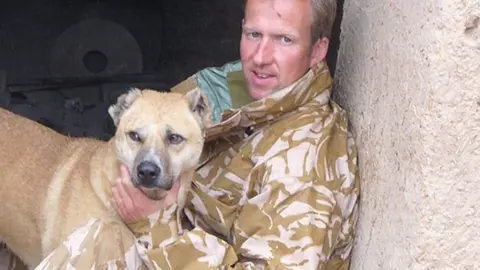 Nowzad
NowzadThe next day, Mr Farthing returned to the airport with the animals alone, and successfully made it out. His staff were able to cross the border to Pakistan in September and later made it to the UK.
"We rescued 94 dogs and 68 cats," he says, talking from his home in Exeter.
"Resettling them is an amazing feeling and so is seeing our staff being resettled - 67 staff have now turned into 69.
"Two of our staff members' wives were pregnant and have now had their little babies, a boy and a girl, so we are truly happy they've now got an opportunity to be raised in the UK, with all the freedoms we take for granted."
However, he is very aware that the mission divided opinion in his home country and he is still dealing with daily online abuse.
"Today I received an email calling me a disgusting human being for putting animals above people," he says, looking defeated.
That narrative was reinforced when a government whistleblower spoke out about the evacuation calling it dysfunctional and chaotic.
Raphael Marshall, who worked as a desk officer in the Foreign Office, said clearance for Operation Ark came "at the direct expense" of thousands of Afghans left behind.
There was "no justification for concluding that Nowzad's staff were at significant risk" from the Taliban, he said.
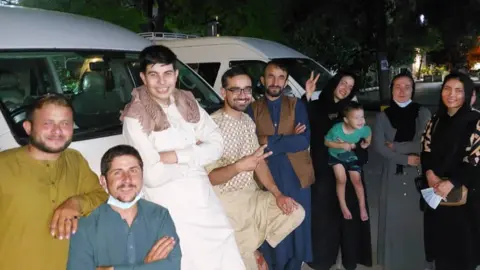 Pen Farthing
Pen FarthingHe said the decision to transport dogs used up capacity, so there was less space at the airport and fewer soldiers available to escort evacuees.
Mr Farthing furiously denies this, insisting no British military resources were used.
He was originally happy that someone else was backing up his comments about the evacuation, about it being a "complete disorganised mess" with thousands of people left behind.
But when he carried on reading the report, he says he felt incredibly upset.
"He has just gone on what he believes happened, which isn't what happened at all. At no time did any British soldiers leave Kabul airport to get me in, I'm dumbfounded that he's said this to Parliament.
"As a charity, how many times do we have to tell people the truth? He said the government transported our animals. We left Kabul on a privately chartered flight, there was no government involvement."
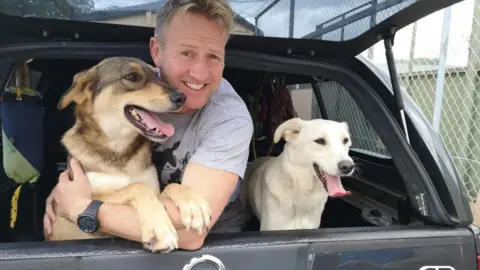 Pen Farthing
Pen FarthingMr Farthing has also been criticised for leaving on a plane that was empty apart from his animals. He says all of the pets apart from Ewok, his rescue Pomeranian, were in the cargo, where people are not allowed. He says he offered the actual seats to the government "so many times yet they refused".
"We had a flight with space for 230 people and there was just me sat on it. Desperate people needed to leave, it makes me so angry and sad.
"It just doesn't make sense to me and I don't understand how I get that truth out. What do we have to do to get people to understand what went on?"
Mr Farthing also insists the government had no involvement in getting his staff to Pakistan, saying he hired a private security company to get them to safety.
He is excited to see what the future holds for his staff in the UK, but says there is always "that stress in the background".
"The fact is we should be celebrating that 67 people escaped Afghanistan. We managed to save our dogs and cats but it just seems that people don't want to let it go and I just can't get my head around that."
The mission, which cost the charity about £500,000, drew the attention of the charity commission, which sent Nowzad a letter about the funding arrangements, but Mr Farthing says it was blown out of proportion.
"They just asked us to clarify what Operation Ark was, which we did and they wrote back saying 'that's absolutely fine, no problems at all'."
A spokesperson for the Charity Commission said: "We continue to engage with the trustees of Nowzad, over the charity's governance, including trustee decision-making, and the charity's purpose and future direction.
"The trustees are co-operating with us."
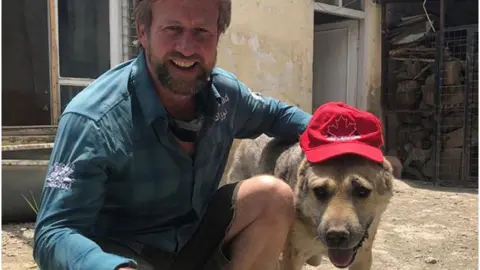 PA Media
PA MediaNow Mr Farthing wants to focus on the charity and hopes to restore its reputation so that people have "100% faith" in it.
Some of the pets that came back from Kabul are being reunited with their owners who escaped to places as far afield as Chile, Dubai Turkey, the US and Canada.
Other animals didn't have homes and are now going through the process of finding owners.
Though the charity's dog and cat programme in Kabul has been forced to close, the donkey rescue is still in operation there, run by staff who decided to stay because they couldn't face leaving their extended families.
"They're struggling every day with food prices, which have gone through the roof," he says.
It is very difficult to get money through to them because the banks are not functioning, he says, and he worries about them daily.
The Taliban raided the charity's offices after he left, which he says shows his staff were at risk.
"They confiscated our vehicles and some of our equipment, our staff were arrested and the Taliban had photos of me on their phone and were asking where I was," he says.
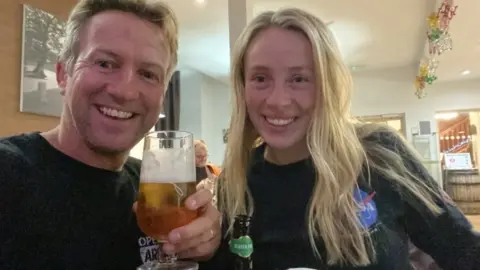 Pen Farthing
Pen FarthingDespite his obvious love for Afghanistan, he can't see himself ever moving back there, knowing he is such a target. Instead, he is settling into life in Exeter with his Norwegian wife Kaisa, an NGO worker whom he met in Kabul, and their rescue dogs.
He gives the impression they might not stay there for long, though, once they decide on their next mission.
"Our passion is with the dogs and cats and doing what we can to prevent rabies, which is a horrendous disease in the Middle East and East Asia, so it's something we are looking at, where can we go next and what we can do," he says.
"It's got to be a country not at war. I've done my time now in a warzone and we want to go somewhere a little bit more hospitable and welcoming. That's what we'll do."
A government spokesperson said: "UK Government staff worked tirelessly to evacuate more than 15,000 people from Afghanistan within a fortnight. This was the biggest mission of its kind in generations and the second largest evacuation carried out by any country. We are still working to help others leave.
"More than 1000 FCDO staff worked to help British nationals and eligible Afghans leave during Op Pitting. The scale of the evacuation and the challenging circumstances meant decisions on prioritisation had to be made quickly to ensure we could help as many people as possible.
"Regrettably we were not able to evacuate all those we wanted to, but our commitment to them is enduring, and since the end of the operation we have helped more than 3000 individuals leave Afghanistan."

Find BBC News: East of England on Facebook, Instagram and Twitter. If you have a story suggestion email [email protected]
